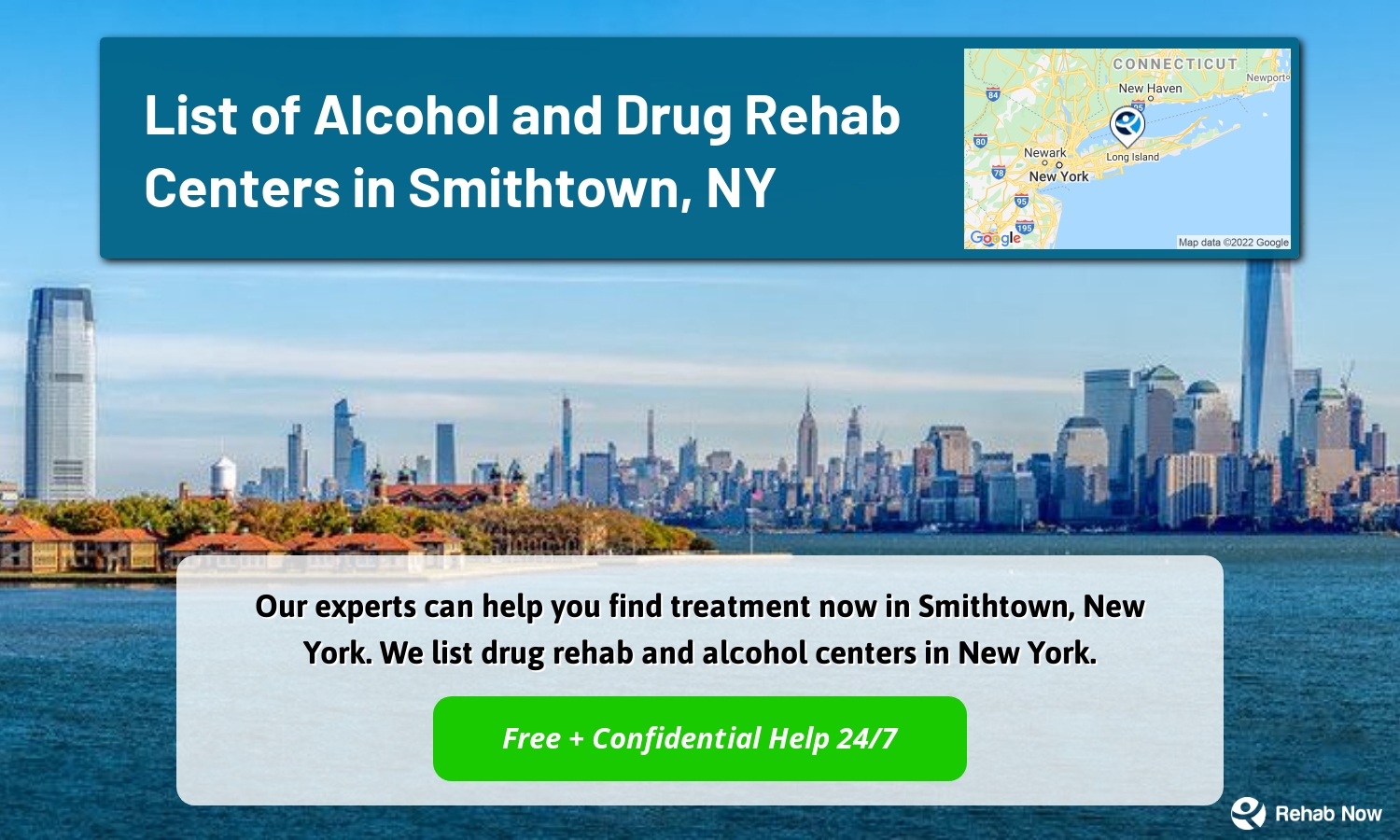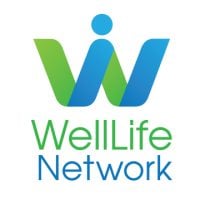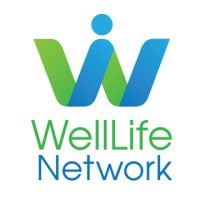List of Alcohol and Drug Rehab Centers in Smithtown, NY
Unfortunately, drug addiction and abuse are a problem in Smithtown, New York. According to the National Institute on Drug Abuse (NIDA), in 2017, about 7% of people aged 12 and older in Smithtown, NY, reported using illicit drugs. This is higher than the national average of 5%.
The most commonly abused drugs in Smithtown, NY, include alcohol, marijuana, prescription drugs, and heroin.
Drug abuse and addiction can lead to some serious consequences for the community in Smithtown, NY, including job loss, financial problems, relationship issues, legal problems, and health problems. Drug addiction can also lead to death.
If you or someone you know is struggling with drug addiction, many resources are available to help.
Here we list Smithtown addiction rehab facilities and centers, many with exclusive programs of their own. There is hope in New York due to a number of drug and alcohol recovery facilities for genuine reasons and for a healthier life in cities like Smithtown.
Don’t do it alone – we’re here to help you with admissions.
We will help you find treatment based on your location, budget, and specific needs and help you get started safely.
Free + Confidential Consultation
Browse 6 Centers in Smithtown, New York
Town of Smithtown/Horizons Counseling, located in Smithtown, NY, is a reputable drug treatment facility offering a range of treatment options for individuals struggling with opioid addiction, substance abuse, drug addiction, alcoholism, and mental health issues. They are accredited by the state and accept private health insurance as payment.

Pederson Krag - North is an addiction treatment center located in Smithtown, NY that offers evidence-based treatments such as cognitive behavioral therapy (CBT) and other individualized interventions to help individuals overcome drug and alcohol addiction, as well as dual-diagnosis treatment for those with mental health issues; all of which are covered by private health insurance for the best possible care.
The Horizons Counseling & Education Center is an accredited and licensed Drug Rehabilitation Facility in Smithtown, New York that provides a wide range of Aftercare support, Detox, Outpatient, and Inpatient services for individuals suffering from Alcoholism, Opioid Addiction, Dual Diagnosis, and Drug Addiction since 1979.


Pederson Krag - North in Smithtown, New York, is an addiction treatment facility offering a comprehensive range of services, such as detox, drug rehab, dual-diagnosis treatment, and counseling, to individuals battling alcoholism, opioid addiction, substance abuse, and drug addiction.
This outpatient addiction treatment facility in Smithtown, New York offers comprehensive care and aftercare support, including dual diagnosis, for those suffering from substance abuse and accepts private health insurance.
This New York-based addiction treatment center provides Aftercare Support, Drug Rehab and Outpatient Levels of Care to those suffering from drug or opioid addiction, and accepts private health insurance to make the treatment more accessible.
Finding Treatment Outside of Smithtown, New York
If you or a loved one is struggling with addiction, knowing where to turn for help can be difficult. Addiction is a complex disease, and treatment requires specialized care. While there are many excellent addiction treatment facilities in Smithtown, New York, sometimes the best option is to seek treatment outside of the city. There are several reasons why someone might choose to get treatment outside of Smithtown. Maybe they’re looking for a fresh start in a new environment, or they want to be away from triggers and temptations. For this reason, many excellent addiction treatment facilities are located outside Smithtown. If you’re considering treatment outside of the city, here are a few things to remember. First, make sure to do your research and find a reputable facility with experience treating your specific type of addiction. Second, be sure to consider the logistics of travel and accommodations. And finally, remember that addiction is a lifelong disease, so choosing a treatment facility that you’re comfortable with and can see yourself staying at for the long haul is essential.

Types of Treatment in Smithtown, New York
Smithtown, NY, is home to various treatment facilities that offer a wide range of services. Several detox and rehab centers provide around-the-clock care and support for those struggling with addiction. Several outpatient facilities offer counseling and therapy services. In addition, several halfway houses and sober living homes provide a safe and supportive environment for those in recovery. Whatever your needs may be, a treatment facility in Smithtown, NY, can help you on your journey to recovery.
?Residents of Smithtown, New York, who get sober can expect to find some alcohol and drug rehab centers in their area. Some support groups are also available for those who need help staying sober. Smithtown is a great place to live sober, with plenty of things to do and friendly people who will support your sobriety.
Drug and Alcohol Statistics in Smithtown, New York
According to the National Institute on Drug Abuse, about 10.3% of people aged 12 and older in New York state reported using illicit drugs. This is higher than the national average of 8.7%. However, it is important to note that drug use varies significantly from one community to another. In Smithtown, NY, the drug use rate is likely higher than the state average.
- In Smithtown, New York, 1,251 drug-related emergency department visits were in 2014. That’s an average of 3.4 per day.
- In Smithtown, New York, Cocaine was the most commonly reported illicit drug among emergency department visits (27%), followed by marijuana (25%) and prescription opioids (20%).
- In 2014, there were 23 drug-related deaths in Smithtown, New York. That’s an average of 0.1 per day.
- In 2016, there were 474 drug arrests made in Smithtown, New York.
Additional Treatment Centers in New York
More than 2 million New Yorkers are currently suffering from some type of substance abuse and many of those are minors. Alcohol abuse, in particular, is prevalent among those underage. As a result of the high prices and regulation of prescription drugs, many New Yorkers turn to heroin instead. This has led to a serious heroin epidemic in the state.
Still haven't found the right recovery center? Browse nearby New York cities.
- Hempstead, NY (24.8 mi.)
- Ellenville, NY (86.5 mi.)
- Tarrytown, NY (38.2 mi.)
- Ballston Spa, NY (152.2 mi.)
- Yorktown Heights, NY (42.0 mi.)
- Highland, NY (72.0 mi.)
- Freeville, NY (199.4 mi.)
- Elmsford, NY (35.7 mi.)
- Lake Placid, NY (240.2 mi.)
- Watertown, NY (256.6 mi.)
- Batavia, NY (296.8 mi.)
- West Babylon, NY (12.9 mi.)
- New York, NY (301)
- Brooklyn, NY (208)
- Bronx, NY (156)
- Buffalo, NY (101)
- Rochester, NY (71)
- Albany, NY (51)
- Syracuse, NY (48)
- Staten Island, NY (44)
What are Some Common Relapse Triggers for Addiction in Smithtown, NY?
When someone first becomes sober, they must be very careful about the people, places, and things they associate with their past drug use. This is because these things can trigger a relapse and cause them to start using drugs again. Some common addiction triggers include:
People: Many people who struggle with addiction have certain people in their life who used drugs in the past. These people can be a trigger for relapse because they can remind the person of their past drug use.
Places: Places where the person used to buy drugs or use drugs can also be a trigger for relapse. This is because these places can remind the person of their past drug use.
Things: Things like drug paraphernalia can also be a trigger for relapse. This is because they can remind the person of their past drug use.
It’s important for people in recovery to be aware of these triggers and to avoid them if possible. If they can’t avoid them, they should have a plan in place for how to deal with them.
Comprehensive Drug Rehabilitation Programs in Smithtown, New York
Smithtown, New York, is home to several comprehensive drug rehabilitation programs. These programs offer a wide range of services, including detoxification, counseling, and medication-assisted treatment. Inpatient and outpatient programs are available, and most programs accept insurance. The length of stay in a rehabilitation program varies depending on the individual’s needs, but most programs last for 30 days. Smithtown also offers some 12-step recovery programs, such as Alcoholics Anonymous and Narcotics Anonymous. These programs are freely available to anyone who wishes to participate. For those looking for a more holistic approach to recovery, alternative healing modalities are available, such as acupuncture and yoga. With so many options available, there is sure to be a drug rehabilitation program that meets your needs.
How Can Family Members Support their Loved Ones During Rehab, And What Should They Expect When their Loved One Returns Home After Completing Treatment?
One of the most important things that family members can do to support their loved ones during rehab is to be there for them emotionally. This means being available to listen, offering encouragement, and providing a shoulder to cry on when needed. It’s also important to be understanding and patient, as the road to recovery is often long and difficult. In addition to emotional support, family members can offer practical help, such as childcare, cooking, and transportation.
When their loved one returns home after completing treatment, family members should expect that they will still need support. addiction is a chronic disease, which means that it’s something that requires ongoing management. As such, it’s important for family members to continue to be understanding and available when needed. Additionally, it’s helpful to have realistic expectations about what the person in recovery can handle regarding life stressors and triggers. By having realistic expectations and continuing to offer support, families can play a vital role in helping their loved ones maintain sobriety in the long term.
Our experts can help you find treatment now in Smithtown, New York. We list drug rehab and alcohol centers in New York. (888) 674-0062.





